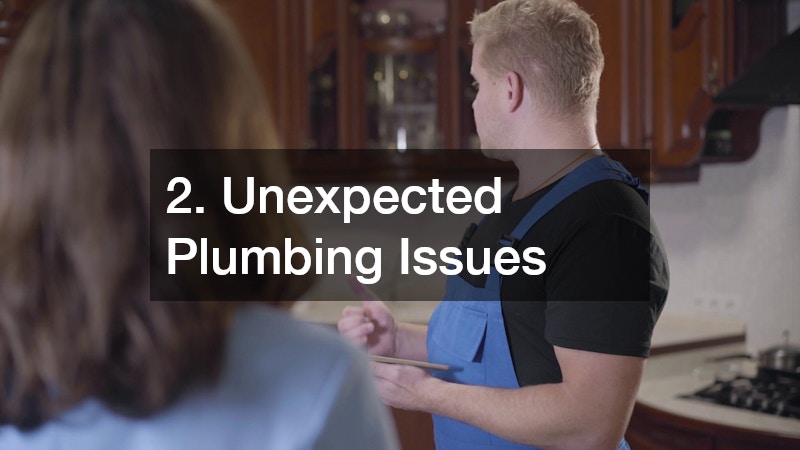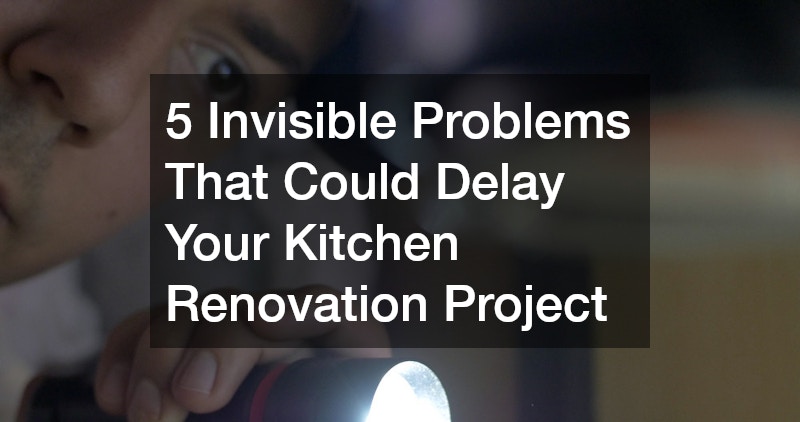A kitchen renovation can transform your home, boost its value, and create a space you’ll enjoy for years. But even with careful planning, unexpected issues can cause costly delays. Often, the problems that derail renovations aren’t immediately visible. Hidden leaks, plumbing complications, structural issues, and material delays can all push back your timeline if you’re unprepared. By understanding the invisible risks and planning ahead, you can keep your project on track, avoid unnecessary stress, and protect your investment.
1. Hidden Water Leaks

One of the most common yet overlooked causes of renovation delays is hidden water leaks. Old or poorly maintained plumbing can develop slow leaks that remain undetected for months—or even years. These leaks might be behind walls, under flooring, or concealed beneath cabinets. During a renovation, uncovering a leak can mean stopping work to repair the damage, replacing affected materials, and dealing with potential mould growth.
Investing in professional leak detections before starting your kitchen renovation is a smart move. Advanced detection techniques, such as thermal imaging or acoustic sensors, can locate leaks without tearing apart your walls. Early detection not only prevents delays but also protects your home from water damage that could become a costly headache down the line.
2. Unexpected Plumbing Issues

Even if no leaks are present, plumbing can still surprise you. Older homes may have outdated pipes, non-standard layouts, or hidden blockages that aren’t compatible with your new kitchen design. You might discover that plumbing connections are in awkward positions, water pressure is insufficient for modern appliances, or certain fixtures need upgrading to comply with current building codes.
Having access to a 24 hour plumber during your renovation is essential for handling emergencies and unexpected problems efficiently. Plumbing setbacks can quickly halt progress, so knowing you have a reliable professional on call helps keep the project moving smoothly. Planning for these issues in advance can save both time and money.
3. Structural Surprises

Beneath the surfaces of your kitchen, structural issues can lurk unseen. Rot, mould, termite damage, or compromised joists may only become visible once cabinets, tiles, or flooring are removed. Discovering these problems mid-renovation can delay your project significantly.
Structural repairs often require specialised trades, additional permits, and extra time, which can stretch your renovation timeline. By factoring potential structural issues into your planning, you can create a realistic schedule and budget. Early inspections from qualified professionals give you peace of mind and reduce the risk of expensive surprises.
4. Electrical Complications
Modern kitchens rely on electricity more than ever. From powerful cooktops to built-in appliances and smart lighting, your wiring needs to support increased demand. Older homes may have outdated electrical systems that are incompatible with contemporary kitchen layouts.
During renovation, discovering insufficient wiring or overloaded circuits can halt your progress. Safety is also a concern—faulty or outdated wiring poses a fire risk. Scheduling a licensed electrician to inspect your kitchen beforehand ensures any necessary upgrades are identified early. This proactive approach prevents delays and ensures your new kitchen is both safe and functional.
5. Material Delays and Availability
Even minor supply issues can derail a renovation schedule. Tiles, cabinets, benchtops, and specialist fittings may take weeks to arrive, especially if they are custom orders or sourced from overseas. Delays in material delivery can stall work, leaving tradespeople idle and increasing project costs.
Confirming lead times with suppliers and ordering materials well in advance is crucial. It’s also wise to have backup options for high-demand items or to choose materials that are readily available locally. Being proactive with materials keeps your renovation on track and avoids last-minute compromises that could affect your design or budget.
6. Hidden Costs and Permitting
Unexpected expenses can arise when hidden problems appear during your renovation. Repairing leaks, updating plumbing, or addressing structural issues can all increase your overall budget. Similarly, certain renovations may require permits or inspections that you didn’t anticipate, particularly if plumbing or electrical systems need upgrades.
Allowing a buffer in your budget for unforeseen issues helps prevent stress when surprises crop up. Researching local regulations and engaging qualified tradespeople ensures you comply with standards while keeping your project timeline realistic.
7. How to Stay Ahead of Hidden Problems
The key to a smooth kitchen renovation is preparation. By identifying potential issues before work begins, you can minimise disruptions and protect your investment. Some essential steps include:
- Scheduling professional leak detections to identify hidden water issues.
- Consulting a 24-hour plumber for emergency access and expert advice.
- Engaging licensed electricians and structural inspectors to review wiring, flooring, and support beams.
- Confirming material availability and lead times well in advance.
- Budgeting for unexpected costs and permitting requirements.
Taking these precautions gives you confidence that your renovation will run as smoothly as possible. A proactive approach prevents delays, keeps tradespeople on schedule, and ensures your new kitchen is completed on time and to a high standard.
A kitchen renovation can be a transformative experience, but hidden problems have the potential to derail even the best-laid plans. By staying vigilant and proactive, you’ll avoid delays, unexpected costs, and emergency calls—allowing you to enjoy your dream kitchen sooner and with peace of mind.
